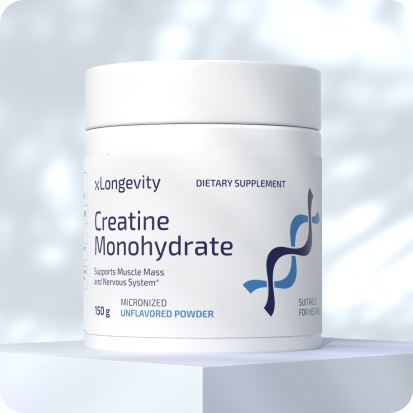Creatine

Creatine plays a significant role in promoting longevity, particularly through its impact on muscle and cognitive health. By enhancing ATP production, creatine supports cellular energy, which is essential for maintaining muscle strength, endurance, and recovery. In the brain, creatine provides neuroprotective benefits, aiding mitochondrial function and supporting neurotransmitter balance, which may slow cognitive decline. These effects make creatine a vital nutrient for sustaining both physical and mental health as we age, contributing to improved quality of life and resilience against age-related decline.
-
Studies
19 -
Double-blind placebo
Yes
References
- A Clinical Study to Investigate the Effects of Creatine Supplementation on Muscle Energetics and Cognitive Function in Young Healthy Male Athletes and an Ageing Population
- A double-blind, placebo-controlled randomized trial of creatine for the cancer anorexia/weight loss syndrome (N02C4): an Alliance trial
- Novel renal biomarkers show that creatine supplementation is safe: a double-blind, placebo-controlled randomized clinical trial
- A randomized, double-blind, placebo-controlled, proof-of-concept trial of creatine monohydrate as adjunctive treatment for bipolar depression
- A randomized, double-blind, futility clinical trial of creatine and minocycline in early Parkinson disease
- Effect of Creatine Supplementation on Functional Capacity and Muscle Oxygen Saturation in Patients with Symptomatic Peripheral Arterial Disease: A Pilot Study of a Randomized, Double-Blind Placebo-Controlled Clinical Trial
- Creatine Supplementation in Fibromyalgia: A Randomized, Double-Blind, Placebo-Controlled Trial†



